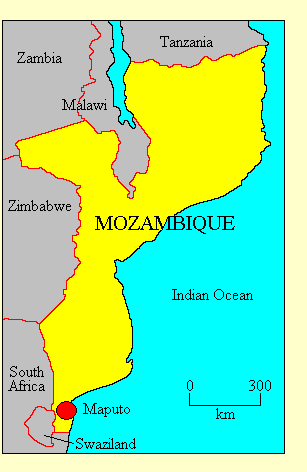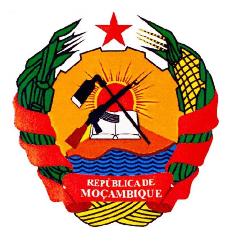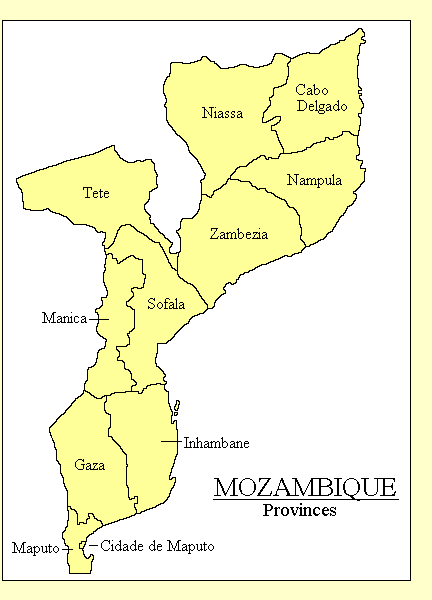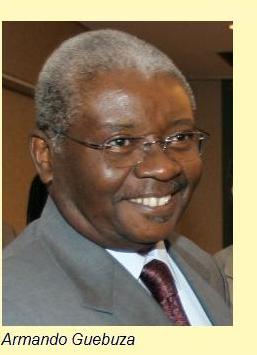

REPUBLIC OF MOZAMBIQUE
Official name: Republica de Mocambique (Republic of Mozambique)
Location: Southern Africa
International organisations: African, Caribbean and Pacific Group of States, African Union,
Commonwealth of Nations, Non-Aligned Movement, World Trade Organisation
Borders: Malawi, South Africa, Swaziland, Tanzania, Zimbabwe
Coastline: Indian Ocean
Land area: 801,590 Km2
Population: 22,900,000
Annual GDP (PPP) per capita: US$900 (2009 CIA estimate). World ranking: 181
Ethnicity: Almost the entire population belong to African ethnic groups, of which the
largest are the Makua-Lomwe (about 50%), Thonga (24%), Malawai (12%) and Shona (6%)
Languages: Portuguese is the official language and the language of business and media.
It is widely understood in urban areas. KiSwahili is also used in coastal areas.
African languages (corresponding to the ethnic groups listed above) are spoken in the interior.
Religion: Indigenous beliefs 50%, Catholic Christian 30%, Sunni Moslem 20%
Form of government: Presidential democratic republic. Mozambique is divided into
ten provinces and one urban district.
Capital: Maputo
Constitution: The new
Constitution
of the Republic of Mozambique came into effect on 30 November 1990.
Head of state: The President, elected by direct universal suffrage for a five-year term.

Head of government: The Prime Minister, appointed by the President. In theory the
Prime Minister is accountable to the legislature but in the current circumstances is
answerable to the President.
Legislature: Mozambique has a unicameral legislature. The Assembly of the Republic (Assembleia da Republica)
has 250 members, elected for five-year terms by proportional representation. The Assembly no longer has a
website.
Electoral authority: The Mozambique Elections Commission administers national elections.
The Commission does not appear to have a website.
• Freedom House 2011 rating: Political Rights 4, Civil Liberties 3
• Transparency International Corruption Index: 27% (116 of 178 countries rated)
• Reporters Without Borders Press Freedom 2010 Index: 73.5% (98 of 178 countries rated)
• Heritage Foundation Economic Freedom 2010 Index: 56.8% (109 of 179 countries rated)
Political history
The coastal areas of what is now Mozambique were brought under Portuguese rule in the
16th century, although the interior was not fully subjugated until the 19th century.
Since Portugal itself was a dictatorship from the 1920s until 1974, Portuguese colonial
rule was correspondingly harsh. A small group of white settlers ruled in feudal
fashion over the African population, who were exploited as forced labourers on plantations.
Armed resistance to Portuguese rule began in the 1960s when it became clear that
Portugal did not intend following Britain and France down the path of decolonisation. The
Marxist Front for the Liberation of Mozambique (FRELIMO) waged a sporadic guerilla war
from bases in Tanzania. The April 1974 coup in Lisbon ended Portugal's days as a colonial
power, and Mozambique became independent in June 1975.

FRELIMO came to power without elections, and imposed one-party rule and a
Communist political system on the country, with predicatably disastrous consequences,
which were aggravated by the emigration of the skilled white settlers. South Africa
sponsored the anti-Communist Mozambican
National Resistance (RENAMO) and a bitter civil war was waged
through the 1980s, characterised by RENAMO atrocities and government counter-measures.
The simultaneous end of Communism and the apartheid regime in South Africa brought
this conflict to an end. FRELIMO abandoned Marxism and a new constitution was passed in
1990, establishing a multi-party democracy and (at least in theory) a market economy. In
1992 FRELIMO and RENAMO signed a treaty agreeing to end armed conflict.
Since 1992 FRELIMO has continued to win
both presidential and legislative elections under the leadership of President Joachim
Chissano and his successor Armando Guebuza.
Guebuza has a reputation as a FRELIMO hardliner, but there has been
gradual move towards more democratic and transparent government since he came to power.
RENAMO is now a legal opposition party, although
its appeal is limited by its violent past and its autocratic leader Afonso Dhlakama.
Freedom House's 2011
report on Mozambique
says: "Mozambique is not an electoral democracy. While international observers have deemed the overall outcomes of
Mozambique's national elections to have reflected the will of the people, electoral processes have repeatedly been
riddled with problems. The 2009 elections were particularly criticised for the widespread rejection of party lists
and for irregularities in the tabulation of results... Despite the introduction of elected provincial assemblies and
municipal governments, power remains highly centralized, particularly in the hands of the president... FRELIMO is the
only party to have held power nationally, and its unbroken incumbency has allowed it to acquire significant
control over state institutions. In the lead-up to the 2009 elections, the government was heavily criticised for the
CNE's disqualification of MDM candidates in 7 of the country's 11 parliamentary constituencies...
Corruption in government and business remains pervasive, despite increased efforts to curb it...
While press freedoms are legally protected, journalists are sometimes harassed or threatened and often
practice self-censorship... The right to assembly is subject to notification and timing restrictions, and in
practice, it is also subject to governmental discretion... Judicial independence is undermined by endemic corruption,
scarce resources, and poor training. The judicial system is further challenged by a dearth of qualified judges and a
backlog of cases."
Updated November 2011
|


